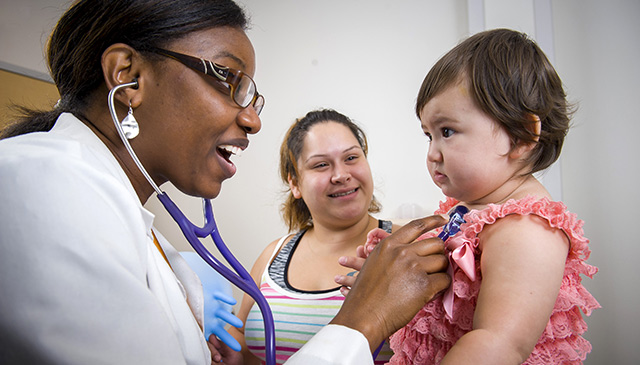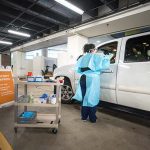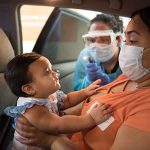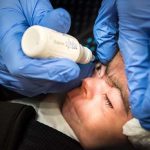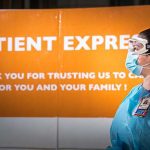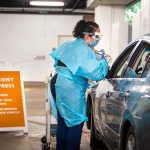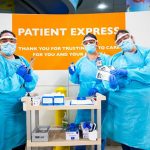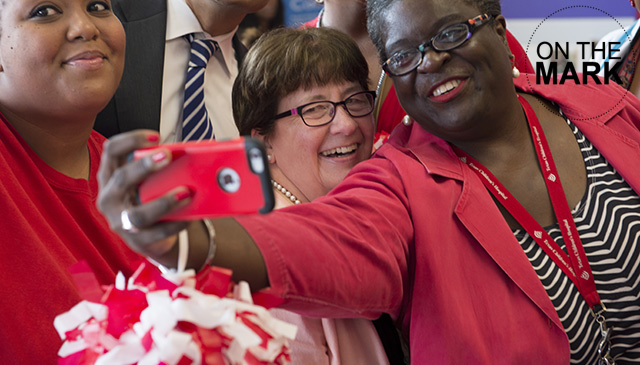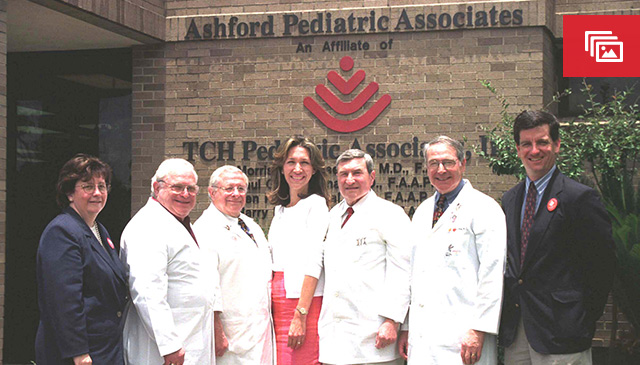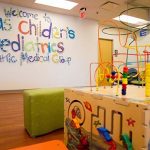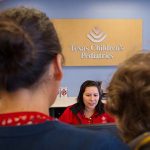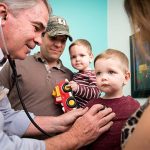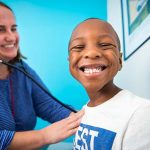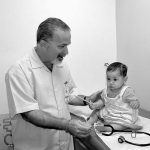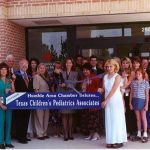August 3, 2020
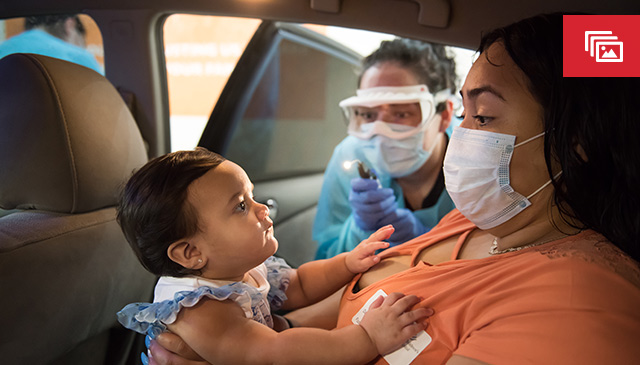
Aimee Martin’s two-year-old daughter Hope is extremely social. She chats up anyone she sees whether they are a stranger or a friend, and she does so at close range. Telling her to keep her distance to protect herself and others from COVID-19 is something she has a hard time comprehending to say the least.
So, when a routine trip to the ophthalmologist popped up on Amiee’s calendar, she cringed because she knew Hope’s eyes would need to be dilated and that they would have to spend at least 30 minutes in the waiting room of Texas Children’s Ophthalmology Clinic.
“Sitting in the waiting room with Hope during a pandemic or not is a train wreck,” Amiee said. “She wants to hug and talk to everyone she sees.”
To help prevent situations such as these and ease people’s anxiety about coming to the hospital during a challenging time, a handful of departments, including Ophthalmology, are offering some of their services via Patient Express, a drive-thru service at Texas Children’s Hospital’s Medical Center Campus.
Set up near the ambulance bay at Wallace Tower, patients call about five minutes before arriving for their appointment, pull up and are seen by a clinician. To ensure everyone’s safety, all patients and family members are asked a series of COVID-19 screening questions, their temperatures are taken and they are required to wear a Texas Children’s-issued mask. Texas Children’s employees participating in Patient Express are required to wear personal protective equipment including a mask, gown, gloves and facial shield.
“It’s great to be part of a project that is good for everyone,” said Ophthalmology Clinic Supervisor Veronica Gonzalez. “I feel like we are taking an extra step to make everyone feel safe – staff, patients and family members.”
Gonzalez’s team is using Patient Express to treat otherwise healthy patients who need to come in for a routine eye exam that requires dilation. Before going into the clinic for their exam, patients get their eyes dilated car side at Patient Express. By the time they park and make their way up to the clinic, it’s about time for their appointment.
Most patients are in and out of the clinic in 30 minutes. Prior to using Patient Express, they would spend an hour to an hour and a half in the facility, half of which was spent in the waiting room during the dilation process.
“Patient Express is a much better alternative,” Martin said. “I appreciate Texas Children’s coming up with the idea and for making our safety and health a priority during such challenging times.”
The drive-through or car side concept began in May when Texas Children’s Pavilion for Women opened a drive-through prenatal clinic at our Medical Center Campus to reduce the anxiety of expectant moms and to lower their risk of COVID-19 exposure and infection.
The clinic, which was recently phased out due to an increase in telemedicine and in-person visits, allowed pregnant women who do not need to be seen in the clinic to remain in their vehicles while being assessed by a health care professional. The drive-through visits included key elements of a prenatal exam such as blood pressure measurements for evaluation for hypertensive disorders of pregnancy, fetal heart rate assessment, and selected ultrasound-based measurements or observations, as well as face-to-face patient-health care professional interaction.
In June, Texas Children’s Dermatology started offering drive-through service via Patient Express to patients who need basic dermatological treatments for conditions such as warts and/or molluscum. The service is being offered every two weeks and has been very successful with both patients and clinicians.
Ophthalmology offers dilating services via Patient Express daily. Pulmonology offers services every other week through Patient Express to cystic fibrosis patients who are undergoing eradication treatment for two types of bacteria they are susceptible to getting and possibly having complications from.
“There is no need to bring them on site and expose them if we don’t have to,” said Caroline Hanson, who manages the outpatient nursing team for Pulmonology. “Our parents have been very appreciative of our efforts to best care for them and their children.”
To help create a fun environment at Patient Express, Hanson said she plays kid-friendly music when appropriate and hands out stickers any time she can. She said her staff forms a special bond with their patients since they tend to come in frequently and that being able to serve them in this way has been very fulfilling.
Valdemar Garza, practice administrator for Ophthalmology, said he has been impressed with the success of the drive-through service and with the collaboration between several teams to make it happen.
“We received a lot of help from Pulmonology, Dermatology and Women’s Services to come up with our Patient Express plan,” Garza said. “I’m grateful to work for an organization that values such creativity and innovation. It goes a long way in forwarding patient care.”
Click here to watch a video of Patient Express when it began with Dermatology.




